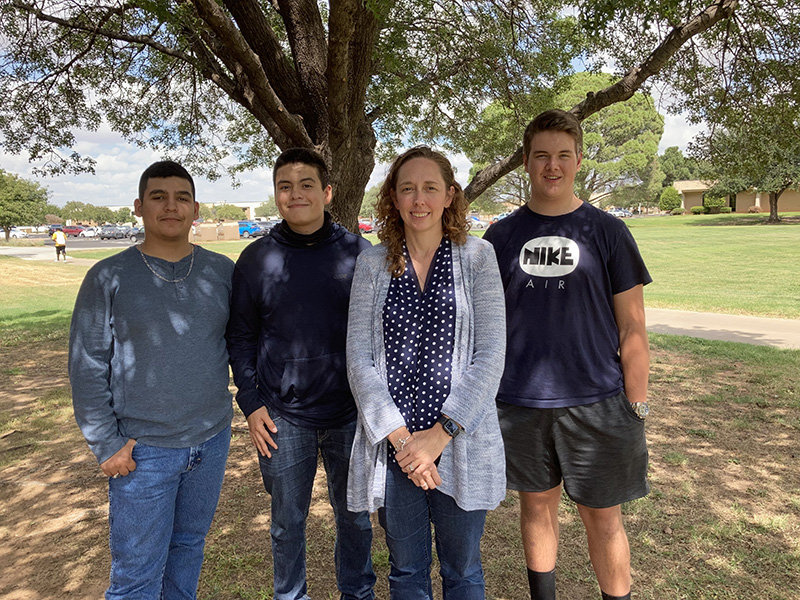 Jael Ornelas, Arnoldo (A. J.) Montanez and Parker Tew were born in different parts
of the country; however, when they met each other in Midland as young high school
students, it all just seemed to “click.” Now the trio enjoy spending time together
attempting to find mathematical solutions to solve social problems while being mentored
by MC Math Instructor Jamie Kneisley.
“I moved to Midland when I was in the 9th grade,” Ornelas said. “A. J. was one of
the first people I met at Midland Freshman School. Then we both were accepted into
ECHS [Early College High School at Midland College] as 10th-grade transfer students.”
It was in ECHS@MC that Ornelas and Montanez joined Tew in their affinity for math.
They are now high school seniors taking dual credit college courses at Midland College.
Last winter, Kneisley proposed to the three students that they enter the American
Mathematical Association of Two-Year Colleges (AMATYC) research competition. They
performed practice research projects during February and then in March were given
the competition problem, which required students to develop a flight plan to Mars
that focused on providing food to sustain a flight crew for an extended period of
time and to develop a plan to maintain a future colony.
“Jael and I were taking Trig from Mrs. Kneisley, and we decided to do the competition
as an honors project,” Tew recalled. “We convinced A.J. who was taking another math
class to join us. I remember practicing during the February snowstorm. It gave us
an opportunity to really concentrate on math modeling. It was the first time any
of us had ever done anything like that.”
When the team received the competition challenge problem, they immediately got to
work and developed a plan for establishing agriculture, communication with Earth and
maintenance. Their research contained a shipment plan for the amount of food needed
for survival to sustain life for long periods and meals needed to last crewmembers
for six months for the initial trip to Mars. It also included new shipments accompanied
by two astronauts to last the crew a year. The team’s meal plan consisted of variety
and nutritional value. They also considered the cost of meals and ranked the meals
on a variety-nutrient-cost scale, which examined the calorie intake of the astronauts.
In addition, the project established hydroponics of kale, beets, potatoes and rainbow
trout on Mars to create an intertwined ecosystem providing all the necessary nutrients
required for survival while being self-sustaining and relying on minimal support from
Earth. AMATYC selected the team’s submission as one of the top three submissions
from the Southwest Region.
“When we told Mrs. Kneisley that we wanted to enter the competition, we didn’t have
any idea what type of problem we would be given,” Ornelas explained. “It just so
happened that this particular scenario about Mars and growing food appealed to our
interests. I am from a farming family, and I enjoyed the farming aspect of the problem.
A. J. and Parker like astronomy, so the Mars aspect really appealed to them.”
“When we started working together on the project, our work flowed and ebbed really
well,” Montanez said. “We did a little bit of research, came up with a problem statement
and then discussed a way to solve the problem.”
This coming May, all three young men will not only graduate from high school at ECHS@MC,
but also receive Associate of Science degrees from Midland College. They all want
to pursue degrees in engineering with the hopes of transferring to Colorado School
of Mines in August. Montanez is considering petroleum engineering; Tew wants to either
become an aerospace or mechanical engineer; and Ornelas is interested in mechanical
engineering with a biomedical specialization.
“Engineers solve problems,” Ornelas said. “I want to be able to give back to my community
by solving those problems.”
By taking ECHS@MC’s accelerated curriculum and obtaining an associate degree by the
time they graduate from high school, Ornelas, Montanez and Parker will be able to
have a bachelor’s degree in less than three years.
While they have decided to major in Engineering, they also have other interests. Both
Tew and Ornelas enjoy computers. Ornelas prefers coding and networking, and Tew’s
hobbies include building computers.
Ornales is also a self-taught musician and plays the guitar, drums, bass, ukulele
and harmonica. He said that he picked up the guitar when he was 12 inspired by his
father who is also a guitarist.
“My outside interests are a little different from A. J.’s and Jael’s,” Montanez said.
“Right now all my spare time is centered around my Labradoodle puppy!”
“These three young men have been a pleasure to work with,” Kneisley said. “They are
thoughtful, funny and engaging, and they make an excellent team, complementing each
other’s strengths and weaknesses. The problems they used as practice for the competition
problem included developing models to describe and evaluate the long-term feasibility
of converting existing semi-truck fleets to electric fleets and determining the risks
to the U.S. National Parks due to climate-related sea-level changes. Their projects
have included a prioritization of funding when costs are incurred due to these changes.
“Currently, they are working on a long-term project to develop a theoretical model
to address factors leading to teacher attrition in MISD. They will be looking at
factors related to school funding, the boom and bust cycle of the oil economy, and
demographic and socioeconomic information for the Midland population as a whole and
the student and teacher population of MISD, in particular.
“They each seem to have a significant desire to better their environment, and the
problems they have looked at during our time together are evidence of this. When
creating the project for this year, they came up with several ideas but ultimately
chose the teacher attrition problem because they thought, that even a theoretical
solution would have the greatest impact on their community.”
Photo: From left to right, Jael Ornelas, A. J. Montanez, Jamie Kneisley and Parker
Tew
|
